Bug bites and lonely nights: How 17 people live hidden deep in the Toms River woods
TOMS RIVER - A pleasant memory recurs regularly in William Honeker's mind.
In it, he's just come home from work and is relaxing on the couch, watching television while his wife, Diane, cooks his supper.
"You don't know how much you miss it until you don't have it," he said on a warm recent day, sitting outside a tent in the woods of Winding River Park that has been his home since November. "At first, it's kind of like an adventure, (but) I'm 63. I'm getting a little tired out here."
Like the dozen or so others who are living deep in Winding River's woods, Honeker remembers a much different life. He's been married twice; his first wife died of a drug overdose. He was with his second wife, Diane, for 23 years until she suffered a massive heart attack on Christmas morning, 2020 in their home in Middletown's Leonardo neighborhood.
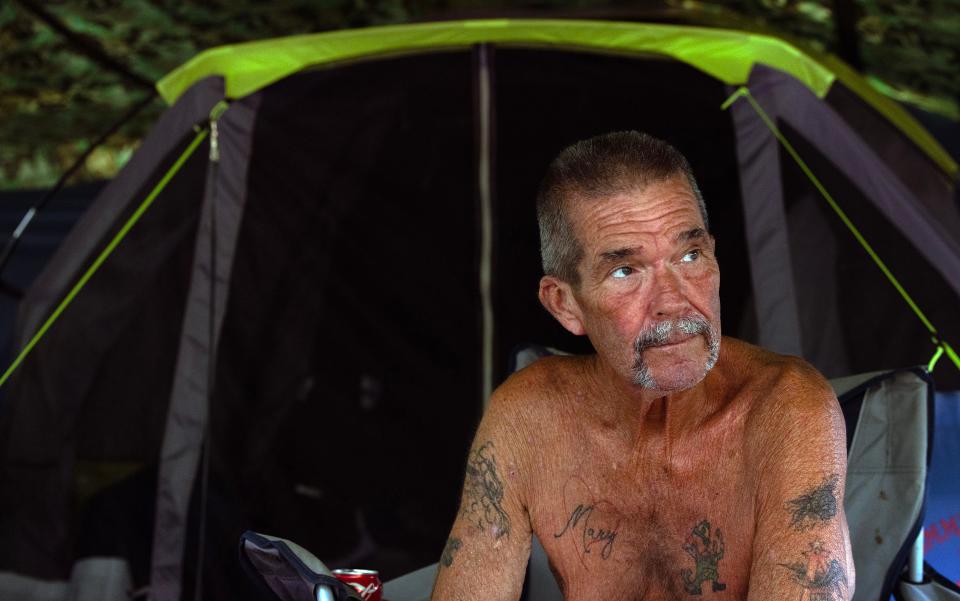
Cost of housing: Even doubled mortgage rates can't stop Jersey Shore home bidding wars
She died three days later, and Honeker admits that after her death, "I fell apart." Lonely, he connected with a woman online, and planned to marry her when she returned from military service. He sold his house and wound up sending $200,000 to her to assist with financial issues she claimed to have; later he discovered it was all a scam.
"I was used to the married life," he said wistfully. "I guess I was naive."
Honeker, who had a liver transplant seven years ago, receives Social Security disability benefits and is no longer able to work in construction. He was a plumber's assistant for many years, but the work is too difficult for his compromised immune system.
Honeker wound up living in his car and at the Jersey Shore Rescue Mission in Asbury Park before a contact at the mission connected him to Minister Steve Brigham of Destiny's Bridge, who told him about the camp in the Toms River woods.
Growing problem: Number of homeless people counted on NJ streets is up 17%
A community deep in the trees
The camp is not easy to find.
It's accessible by bicycle and on foot, but difficult to reach by car. It's about a 10-minute bike ride from the paved trails in Winding River, on a bumpy dirt track lined with tall grasses and pocked with potholes that fill with water after rainstorms. Deep in the woods, a series of tents appears, most tied tight onto trees. The hum of a generator can be heard, and long orange and yellow extension cords connect the tents to the power supply. Lights hang from the trees along a path between tents.
Brigham first discovered the wooded space last year, when he was scouting out spaces for a potential tent camp for those in need of shelter. He chose the area along the power lines, he said, because Jersey Central Power & Light normally does not object to tenters sheltering on its land.
New Jersey rent prices increasing: What's the average rental cost in your town?

"There are no schools, no playgrounds, nothing like that is close by," Brigham said.
The first campers to move in to the area were a father and son who had initially pitched their tent in Toms River's Riverwood Park last winter; the police told them they could not stay there, he said. They had been staying at the township's Code Blue shelter at Riverwood when the temperature dropped below 35 degrees at night, but wound up in the woods on the warmer nights when the shelter was not open.
After receiving a call from the father, Brigham set them up by the power lines. As more people called, seeking help and shelter, Brigham sent them to the same area, and a camp developed there. Brigham supplied tents, portable heaters and a generator. The campers lived in the area through the winter, but were discovered when a helicopter inspecting the power lines flew over them in the springtime.
Brigham decided to move the camp off the power line right-of-way and deeper into the woods, on township-owned property in Winding River Park.
"I thought we'd be safer on public property," Brigham said. "Some high courts have deemed that if there is no shelter in an area, a person has the right to stay on public property."
Ocean County is the only one of New Jersey's 21 counties that does not have a transitional housing facility, a place where those experiencing homelessness could stay temporarily while trying to get back on their feet and find more permanent housing.
"I’ve been doing this 23 years, it is probably, without a doubt, the best camp I’ve ever had," Brigham said. "The scenery, the woods, and also the people. They are older and wiser. They seem to chip in more. They help each other."
Ocean County: Homelessness Trust Fund won’t help with a shelter
Brigham said 17 people are living in the Winding River camp.
Honeker's tent is deep in the woods, down a tree-lined path. His nine-year-old brindle boxer mix dog, Fred, greets visitors who approach his tent.
While he was at the rescue mission in Asbury Park, Honeker had to give Fred up to a shelter as pets aren't allowed in the mission. Giving Fred up nearly broke his heart, he said, as the dog nuzzled and licked his hands.
"I've had this dog for nearly 10 years," Honeker said. "He's part of me." He was able to retrieve Fred from the shelter and bring the dog with him to the woods. He's vowed never to give him up again.
'Nobody has a clue that I am homeless'
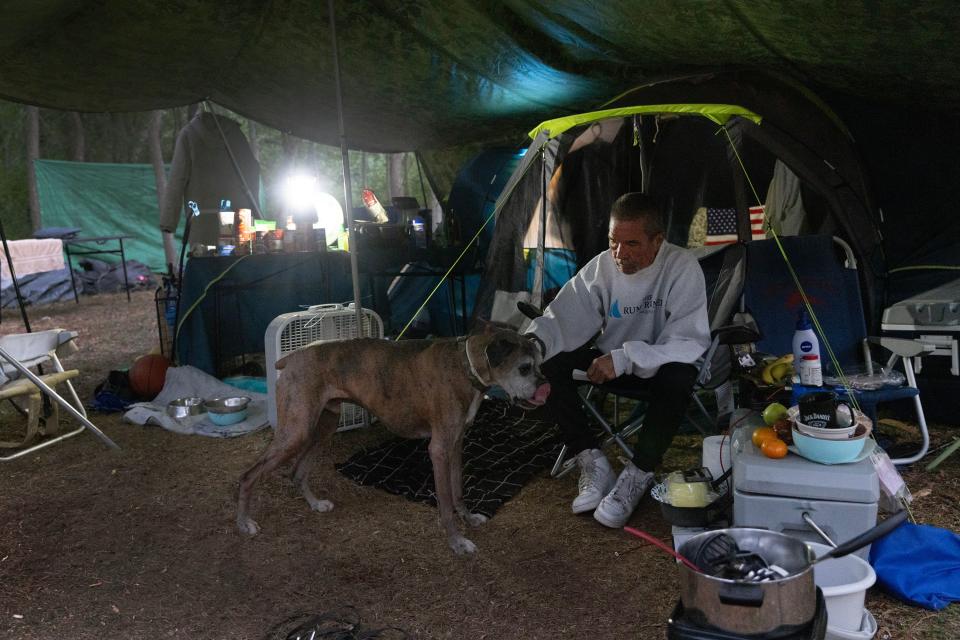
Honeker's days are mostly all the same. In the morning, he walks more than three miles to Planet Fitness, where he works out and is able to take a shower. At the beginning of the month, when he gets his Social Security check, he treats himself to a hot meal, perhaps at the nearby Office Lounge. A neighbor in the tent camp watches Fred while he's away.
"Planet Fitness is my second home," Honeker said. "It keeps my mind off it. If I didn't have that, I don't know where I'd be. Nobody has a clue that I am homeless."
When his clothes become dirty, Honeker piles them in a wagon and walks to a laundromat to do the wash. He is adamant that it's important to stay clean and keep his tent clean. "If you keep it dirty, you live dirty," he said. "I pick up after myself."
The worst part of living in the woods? "The bugs," Honeker said. He lifted one leg to show a series of red bites that ran from his knee to his foot.
"I'm covered with bites, head to toe," he said. "I had to cut my nails so I didn't cut myself. I was bleeding from scratching so much. Bug bites are the roughest part of living out here. At night, you don't even know what is crawling on you." Flies, mosquitoes, ticks and chiggers are a constant bother to all residents of the camp.
Homeless life: Ocean County homeless 'dehumanized' living among grime, crime and bugs in motels
Minister Steve has supplied a generator for the camp, and small propane cooking stoves for its residents. Brigham also brings canned food and produce to the camp regularly; cans of chili, ravioli and stew were stacked on a table outside Honeker's tent.
A group of chickens peck at the ground on the outskirts of the camp. Fed by the tenters, they lay eggs that are shared in the camp. Honeker watches the news and other shows on his cell phone at night, but admits the camp gets lonely when residents are trapped inside their tents by bad weather.
Once every couple of weeks, Brigham holds a barbecue, and residents join to share hot dogs and hamburgers.
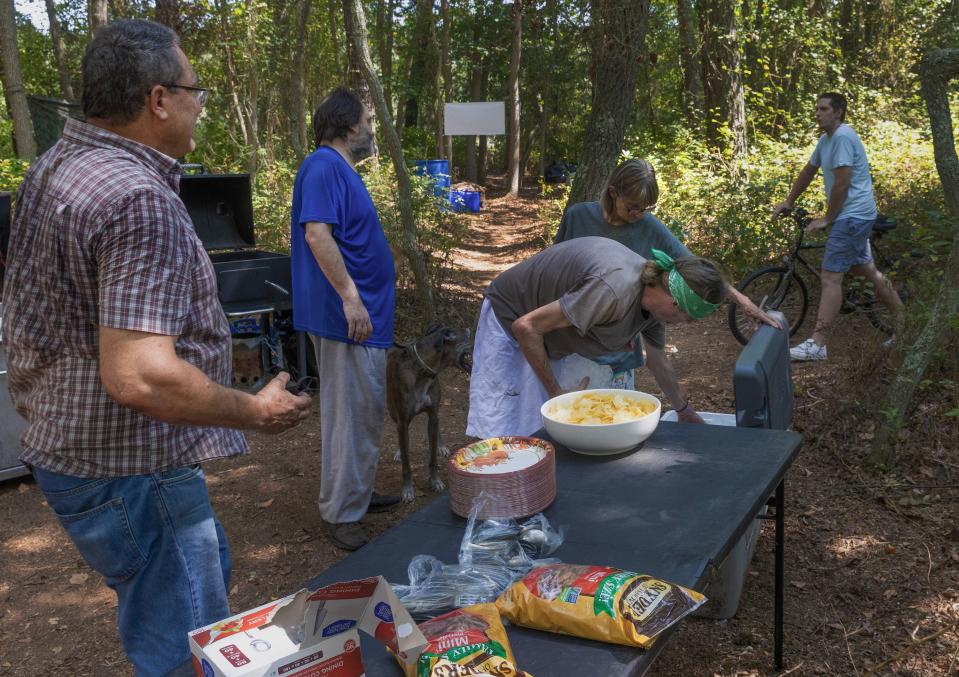
Generally, everyone in the camp gets along, Honeker said. "Everybody has their differences, their quirks, things they don't like about someone," he said. "Some people, you can go in their tent, other people, you can't go in their tent."
Honeker said he's dropped from 185 to 129 pounds during his time in the woods. "You get sick of eating out of a can all the time," he said of his weight loss. He said he's been working with Just Believe Inc., a Toms River advocacy group for those experiencing homelessness, as well as representatives from the county social services department, in an effort to find a place to stay.
"It's difficult with having a dog," he said, but he remains hopeful he can escape the woods before winter. "I don't think people realize that there are as many of us as there are."
Not just statistics: He's 71, an ailing Army veteran, and homeless in Ocean County. How does this happen?
'I learned how to do everything within a month'
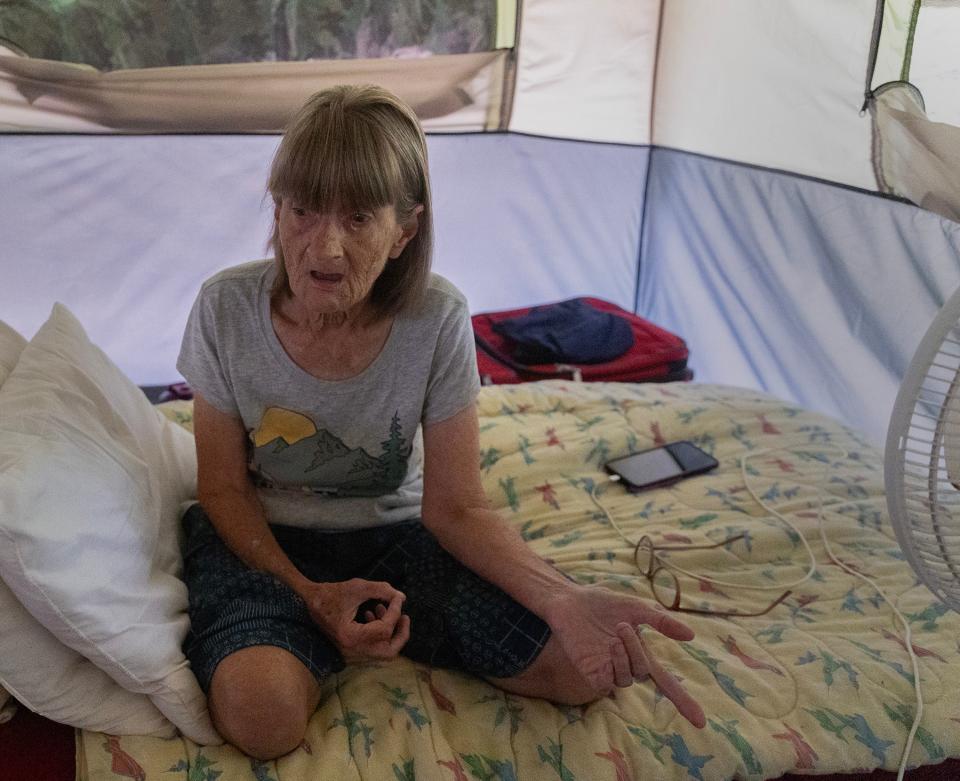
A make-up mirror perches on the table of Mary-Ellen Mullen's tent. Also on the table: a box of Cheez-Its, a can of beef ravioli, some pasta boxes and a container of sweet green peas. The tent's flap is sealed tight against bugs, while a fan stirs the air around.
Mary-Ellen is 66 and has been living in the woods for about five months. Before she lost her home, Mary-Ellen slept on a couch for two years, living with her daughter, her daughter's boyfriend, and his parents. She paid $500 to stay there, using her Social Security benefits. But eventually her daughter and boyfriend decided to move to a smaller place. There was no room for Mary-Ellen.
Put in contact with Brigham, she stayed two weeks in a motel before winding up in the tent camp. "I like it. I don't like the bugs," she said. "I've never been camping in my entire life. I get eaten alive by mosquitoes. I am worried about the ticks."
Still, she has her own place and has gotten used to cooking on the portable stove.
"I learned how to do everything within a month," she said. She recently got a bike, making it easier to get supplies. Ice is a constant need for all the campers, who keep water and other drinks in coolers that must be constantly refilled with ice during hot weather to keep things cold.
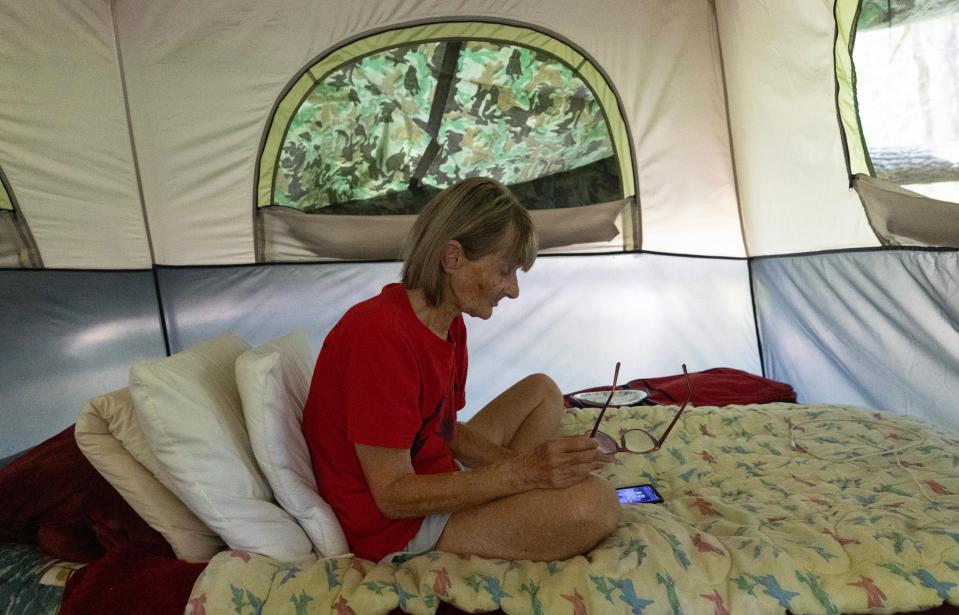
Mullen lived in Seaside Heights for 30 years, and worked for many years at Wawa and was a manager at a McDonald's. She has two children from her first marriage, a son who lives in Point Pleasant and her daughter, Kathleen, who lives in Pine Beach.
Her daughter comes to pick her up on the third of each month, after she receives her Social Security check, so that she can get supplies. "It's a nice little place to live," she said on a warm recent day, sitting on the bed in her tent. "I do what I want." She keeps the tent flaps shut tight to minimize the number of bugs that can get inside; still, some flies buzzed around the tent's roof as she spoke.
Mullen said she leaves the area two or three times a week to get a hot meal, often going to an Italian restaurant in a nearby shopping center.
She was uneasy at first, she admits, fearing the tent's walls might collapse on the first windy night. Now it seems sturdy to her, held up by extra ropes and nestled within the trees.
She says her portable heater and a stash of blankets will keep her warm if she's still in the woods this winter.
She doesn't want to go to live in a motel. "I'd like a nice little apartment. I'd like to have a regular place to live," Mary-Ellen said, but fears her only income, Social Security, would not be enough to pay for a place.
"Most of the people here are fantastic," she said. "We do things for each other. I get along with everybody. I'm kind of a people person."
In August, representatives from the homeless advocacy group Just Believe came with county social workers and township police officers to visit the camp. Paul Hulse, executive director of Just Believe, said the organization was able to help place 18 people in housing in the four days that the team visited the camp. At the time, Hulse said, there were more than 30 people living in tents there.
"We don’t work for the town, we don’t work for the county, we work for the organization," Hulse said. "We try to get them into some type of permanent housing, make sure their needs are being met." He said the group is still working with some of the campers, helping them to get identification or counseling if needed.
'We do what we have to do'
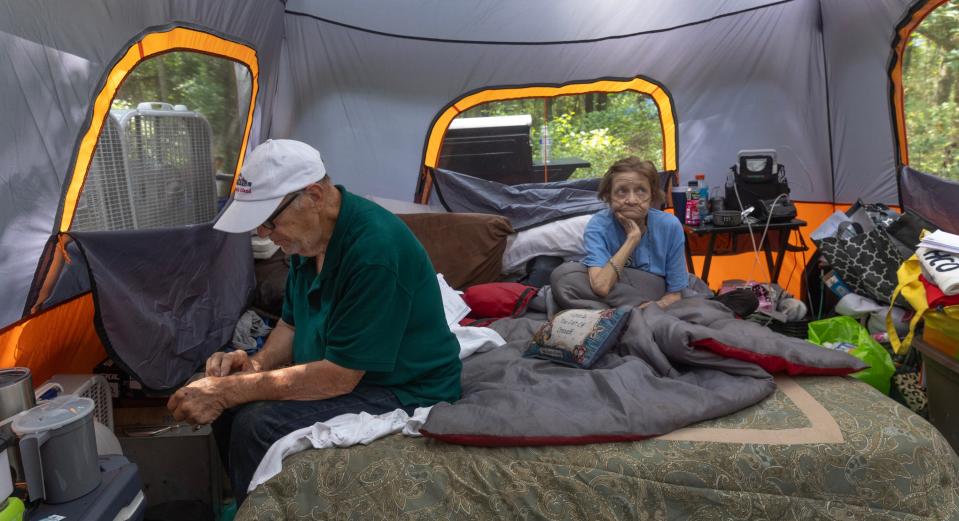
Robert Jamison and his wife, Frances, were living in a trailer at the Surf & Stream Campground in Manchester until the land was sold to the township and the residents evicted earlier this year. With no place to go, they wound up in the Toms River woods.
Frances has COPD and uses oxygen to breathe. She relies on the generator to supply her with a steady flow of oxygen.
Robert, 72, and Frances, 64, moved into the woods with William Robinson, their son, in March, and Robert soon became one of the men who help keep the camp going. That means getting gas for the generator and helping make repairs to things such as propane heaters or the bicycles that help residents get around.
Robert's specialty is bicycles: he finds discarded ones and repairs them, giving them to campers.
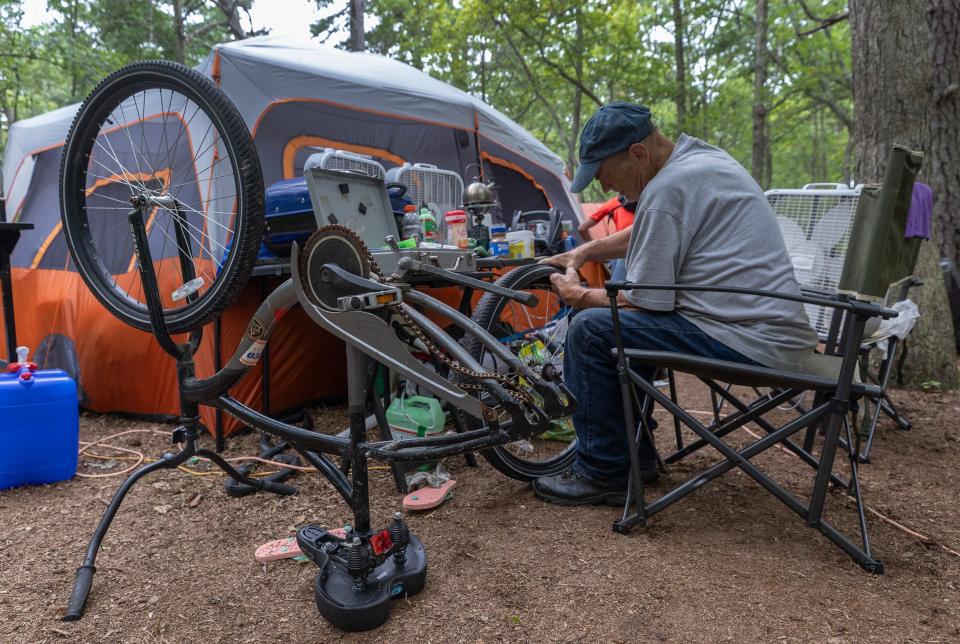
Their bulldog, Lucy, is a familiar sight in the camp. On a recent morning, Frances was feeding her bananas while she sat on the camp bed in their tent. She said she keeps to herself, noting there is "gossip," and there are "nosy people" in the camp. She misses their trailer.
"I don't want an apartment," Frances said. "I have to put up with somebody in an apartment. … I was fine with what I lived in."
"There are basically three of us who do a lot of the work. Myself, Dennis and Tom," Robert said, sitting outside the family's tent on a hot September day. The family uses a barbecue grill located outside the tent to prepare meals; it's hooked up to a propane tank.
He said he grew up in Plainfield and North Plainfield before moving to the Jersey Shore, where he's lived in Brick, Howell and Ocean townships. Robert worked worked 29 years for Ocean Township in Monmouth County. In February, he had a mild stroke. "I said, 'It's time to do something else,'" he said.
"I'd like to get back to a house or trailer," he said. "A lot of the apartments, you can't have pets."
Lucy, who weighs a bit more than 60 pounds, is too big for many apartment complexes, which limit dogs to 25 pounds or less. Like most of those in the tent camp, Robert does not want to go to a motel.
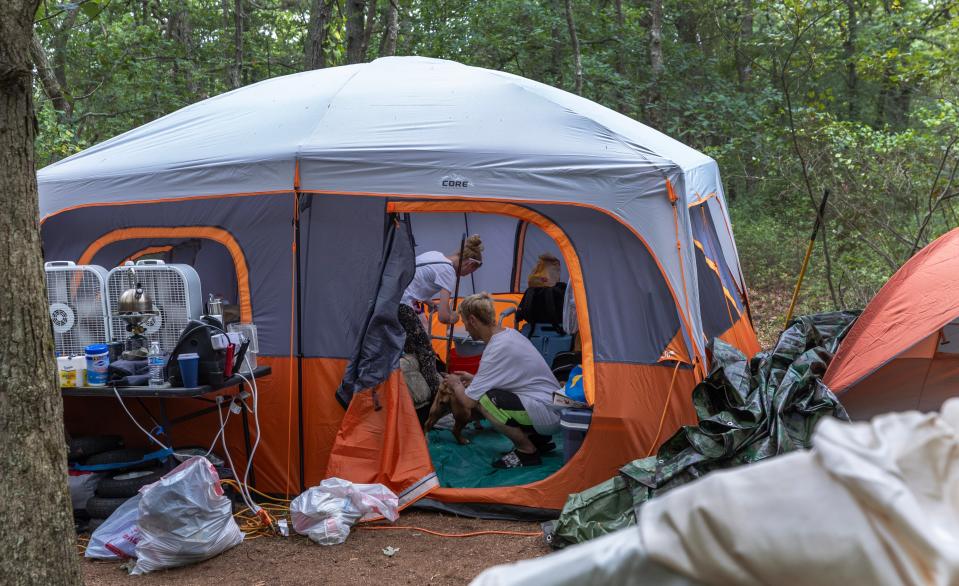
"When you go to motels, they just bounce you around, from place to place," he said. He also fears the family could not bring Lucy there. Recently, the Jamisons were offered an apartment in Egg Harbor Township which they declined. Frances noted that her doctors are all in Ocean County, and Egg Harbor is too far away.
"We do what we have to do, but we're not going down there," Robert said.
Heavy rain in April made the camp muddy and difficult to navigate, and bugs are a constant problem, he said. He doused the area around the tent with a bug repellant. "We didn't have a long enough cold snap last winter to kill them," he said.
For his part, William said he that he "hates the woods," and noted that he was stung by a black wasp recently. "He's always hurting himself," Frances chimed in.
Frances said she's sure the family will not have to endure a winter in the woods.
"We'll be out of here by then," she said, with confidence.
'Just leave them alone'
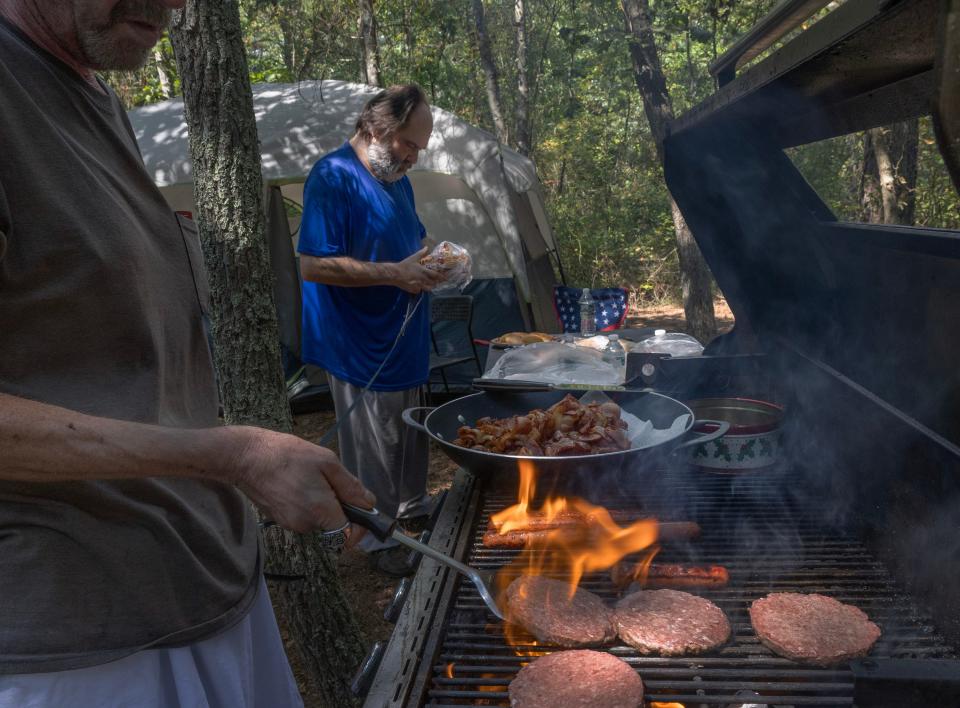
Brigham said that after Just Believe came to the camp with township police, he contacted lawyer and homeless advocate Jeff Wild, who is a partner with the law firm of Lowenstein Sandler. Wild, who is a trustee with the NJ Coalition to End Homelessness, has visited the camp several times.
"None of my clients wants to have to live in the woods — and they are only there because of the inexcusable lack of affordable housing in Ocean County," Wild said. "We are also working closely with Toms River township attorney and chief of police, cooperating to try and locate housing for everyone as soon as reasonably possible." He noted that Just Believe and HABCore, which works to find permanent housing for the homeless, have banded together to help the Toms River campers find shelter.
Toms River Mayor Maurice B. "Mo" Hill Jr. said he is concerned about the tent campers staying in the woods through the winter.
"We'd definitely like to get them out of there," the mayor said. He said the township will work with the county to try to find places for people to live.
But Brigham believes unless agencies can find a year's permanent housing for those living in Winding River Park, they should be left alone.
"They’ve got shelter, they have food, they’ve got community," he said. "The people are relatively happy. … What they are offering them is two weeks in a hotel, and then back on the streets again. … Unless you are offering them a year’s housing, just leave them alone."
Jean Mikle covers Toms River and several other Ocean County towns, and has been writing about local government and politics at the Jersey Shore for nearly 40 years. She's also passionate about the Shore's storied music scene. Contact her: @jeanmikle, jmikle@gannettnj.com.
This article originally appeared on Asbury Park Press: How homeless community grew deep in the Toms River woods

